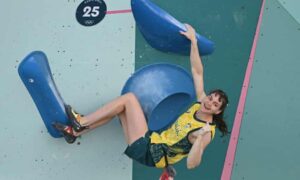
Oceana Mackenzie enters the arena and faces the first “problem” she must overcome, a daunting four-and a-half metre wall studded with a seemingly-random smattering of protrusions. Bouldering, a sub-discipline of sport climbing, requires an intriguing combination of gymnastic strength and mental acuity. Mackenzie, a 22-year-old from Melbourne, must make it up the wall in as few attempts as possible.
Climbers face their problems, as each climbing course is called, blind; the arrangement of boulders on a wall is always changing, with “route setters” finding new ways to challenge the athletes. Before a heat, climbers are segregated in an isolation room so they cannot watch the attempts of earlier competitors on that day’s problems. So when Mackenzie walks onto the stage, before a jovial 6,000 crowd on a sunny Tuesday morning in an outer suburb of Paris, her first task is in the mind – drawing on years of climbing experience to determine the optimal route to the top.
Fortunately, the problem ahead of her was good news. Mackenzie took a brief, quizzical look at wall, head cocked to the side as she took it in, before dusting her hands with chalk. And then she went – one hand here, another foot there, an outstretched arm over there – clambering up the face of the wall with ease and agility. Bouldering is scored with five segments on the wall each worth five points. Reach the top and a climber is awarded 25 points, with deductions if prior attempts are unsuccessful. The competitors attack four problems across a heat, for a total score out of 100.
